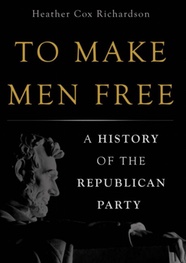NYT History Book Reviews: Who Got Noticed this Week?
 To Make Men Free by Heather
Cox Richardson
To Make Men Free by Heather
Cox Richardson
“To Make Men Free” traces the shifting ways of the Republican Party, from Abraham Lincoln to the Great Recession, showing how its own institutional and ideological shortcomings have had devastating repercussions for minorities, the middle class, and America at large. The book aims to explain how a relatively young party became America’s greatest political hope—and over time, how it became the nation's biggest disappointment.
The Bottom Line: Heather Cox Richardson, an admired historian, is entrusted with letting the people know how the Republicans are mucking up the country. There are two, sometimes three sides to every story, so it looks like readers are going to have to figure this one out for themselves. Politics is a cheeky business, and behind their masks, aristocrats tend to be bluffing. Or just really sunburnt from the previous weekend's outdoor functions.
How it fared from the critic:
Jonathan Rauch, a senior fellow at the Brookings Institution, concluded that:
"...too often her own ideals get in the way of properly understanding those of the Republicans."
“To Make Men Free,” by Heather Cox Richardson, only halfway delivers: It is longer on history than insight.
"Good history is a portal to the past; if only the author had checked her politics at the door."
China 1945 by Richard Bernstein
An historical narrative that has pleased many critics, China 1945 examines the first episode in which American power encountered a powerful Asian revolutionary movement, and challenges familiar assumptions about the origins of modern Sino-American relations. Bernstein tells an elegantly written story of that year’s events, analyzing its components, from relentless infighting and tension among U.S. diplomats, military leaders, and opinion makers to the complex relations between Mao Zedong and his patron, Joseph Stalin.
The Bottom Line: Communism may not be the most viable concept for human society, but it does make for an exciting read most of the time. Judging from some of the reviews on this book, it's highly recommended. It'll make you want to order General Tsao's Chicken post-read. Fortune cookie not included!
How it fared from the critic:
Thomas J. Christensen, author of “The China Challenge: Shaping the Choices of a Rising Power,” concluded:
"Bernstein, a student of Harvard’s John King Fairbank and a former New York Times reporter, covers China’s political context in 1945 like a scholar, but maintains his journalist’s eye for human drama."
"...excellent history of United States policy toward China at the end of World War II."
"Truman chose an ineffective middle road: side with Chiang, but not too much. Bernstein blames American domestic politics for this diluted policy, and there is some truth to that."
The Train to Crystal City by
Jan Jarboe Russell
In her new book, Russell tells the story of a secret FDR-approved American internment camp in Texas during World War II, where thousands of families—many US citizens—were incarcerated. From 1942 to 1948, trains delivered thousands of civilians from the United States and Latin America to Crystal City, Texas, a small desert town at the southern tip of Texas. The trains carried Japanese, German, Italian immigrants and their American-born children. During the course of the war, hundreds of prisoners in Crystal City, including their American-born children, were exchanged for other more important Americans, like diplomats, businessmen, soldiers, physicians, and missionaries who were behind enemy lines in Japan and Germany. A book about a little-known event in American history that has long been kept quiet, "The Train to Crystal City" is an eye opening read.
The Bottom Line: It isn't gossip or exaggerated since Russell has numerous sources to back up what she reveals in the story. I wonder if she is welcomed as a hero when she travels to Tokyo? If they haven't made an anime about her, they will now.
How it fared from the critic:
Janet Maslin said:
"...the facts Jan Jarboe Russell has unveiled are much thornier, more complex and terrible. The tale they tell is almost more than her mind-boggling but awkwardly organized book can handle."
"She [Russell] has doggedly captured the awful intricacies that such a plan wrought, not only on the people who were uprooted but on the officials charged with handling them."
"“The Train to Crystal City” combines accounts of terrible sorrow and destruction with great perseverance..."
Related Link: "The American Internment Camp You Never Heard of" by Jan Jarboe Russell (HNN)
Tune in next time to "Who Got Noticed"!